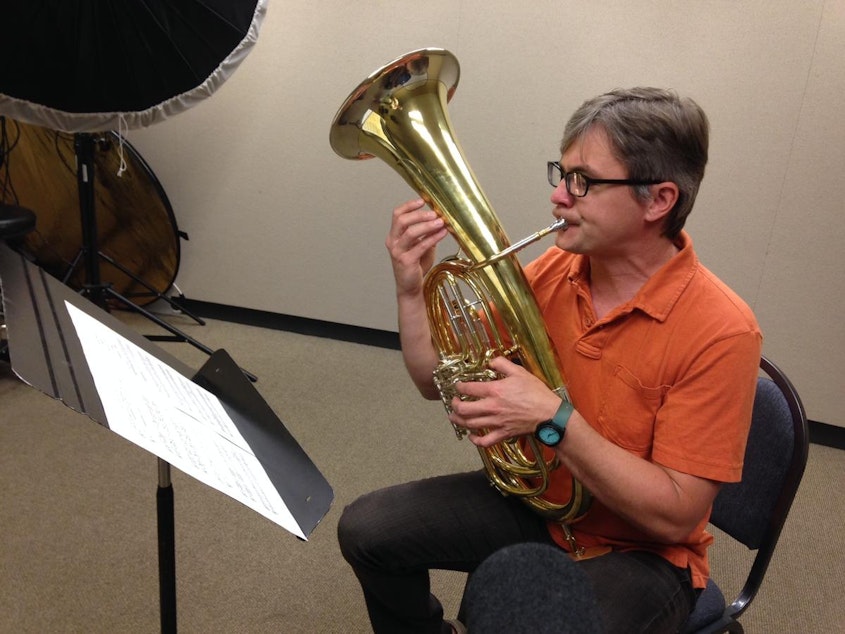Seattle Opera's Wagner Tubas: 'A New Sound We've Never Heard'

As German composer Richard Wagner contemplated the Ring cycle in the 19th century, he decided it wasn’t enough to create a four-night saga of gods and humans.
He also envisioned an instrument that didn’t yet exist, one that could sound "strident" one moment and “gorgeous and mellow” the next. He wrote the music for the Ring in the 1860s and 70s with the instrument in mind. Then he commissioned someone to build it.
Thus the “Wagner tuba” was born.
Now, travel 150 years forward and 6,000 miles across the world.
Four Wagner tubas will make their debut this fall in honor of Seattle Opera’s Speight Jenkins, who has retired from the helm after 31 seasons. Inscribed in those tubas will be Jenkins’ name, in honor of his work taking the Seattle Opera from the local stage to an international level. Jeff Fair, a principal horn player for the Seattle Symphony and Seattle Opera, said the Wagner tuba is a cross between a French horn and a trombone. The instrument is responsible for some of the most compelling and noble musical motifs, like the “Valhalla” theme about the home of the gods. Fair said the Wagner tubas owned by the Seattle Opera date back to the 1970s. “I call them more like band instruments,” he said. “They’re heavy, they’re clunky, they worked OK.”
As Seattle’s Ring cycle gained prestige, they wanted to upgrade. So they rented some Wagner tubas from the turn of the last century.
“They sounded really great, but they literally started falling apart at our last Ring cycle,” Fair said. It was time to invest in something new. Musicians checked out a half dozen different Wagner tubas, but nothing felt right.
Then Fair heard from some musicians with the San Francisco Symphony; they had purchased Wagner tubas from Andreas Jungwirth, an Austrian workshop that makes instruments for the Vienna Philharmonic. Fair made a quick trip to San Francisco, “played their tubas for an hour and thought OK, this is what we’ve been looking for.”
Donors Jeff and Martha Sherman stepped up to pay thousands of dollars for the new Wagner tubas. And Jenkins and the orchestra musicians got to hear them for the first time last Sunday in the rehearsal room at McCaw Hall. Jenkins also learned that the tubas are inscribed with his name.
“It’s a sound we’ve never had before,” Jenkins said, after hearing the sonorous "Valhalla theme" on the brand-new instruments.
Audiences will get their first taste of these instruments tonight at the International Wagner Competition. Then on Saturday they’ll be heard again at a gala in Jenkins’ honor. Jenkins said the Ring is what Seattle Opera is best known for around the world, and it’s a tradition he’s relished. “My connection to Wagner and the Ring has been since I was a child. I’ve loved it," he said. In Seattle, "the fact that the Ring had already been given eight times by my predecessor Glynn Ross certainly made this the most attractive place in the world for me to come to."
Fair said the instruments are a fitting gift for another reason – Jenkins shared a special relationship with the orchestra members. “Of course the audience doesn’t see it, but before almost every show he’s down in the pit or backstage, just saying hi, and to different people each time,” Fair said. So the gift of these instruments is “another symbol of the kind of connection that Speight had with each and every member of the organization.”
Jenkins’ term as general director at Seattle Opera officially ends September 1. But Seattle’s Ring cycle lives on. Seattle Opera is about to release its first-ever “Ring” recording this fall.

